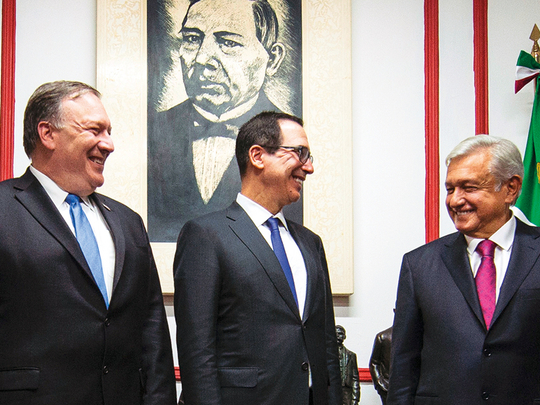
Washington: Secretary of State Michael Pompeo and Treasury Secretary Steven Mnuchin rejected a request from European leaders for broad-based waivers from sanctions the US will reimpose on countries that do business with Iran after the President Donald Trump backed out of the 2015 nuclear accord.
In a letter whose contents were described to Bloomberg News, Pompeo and Mnuchin told the finance and foreign ministers of the UK, France and Germany that the US is seeking to apply “unprecedented financial pressure” on the Iranian regime now that it has quit the Joint Comprehensive Plan of Action, or JCPOA, and won’t relent until it sees a “tangible, demonstrable and sustained shift” in Iran’s policies.
“The president withdrew from the JCPOA for a simple reason — it failed to guarantee the safety of the American people,” Pompeo and Mnuchin wrote in the letter, which wasn’t dated. “We are thus not in a position to make exceptions to this policy except in very specific circumstances where it clearly benefits our national security.”
The letter was a response to a missive from France, Germany and the UK last month in which the three countries said they “strongly regret” the US decision to withdraw and say they expect a host of exemptions, including assurances that “extraterritorial effects” of secondary US sanctions won’t be applied to EU entities and individuals.
While the US has sought to get allies to end all imports of Iranian oil by a November 4 deadline, it hasn’t ruled out the use of waivers in certain circumstances. Oil prices climbed last month as traders weighed the prospect of a larger than expected loss of Iranian crude supply on global markets later this year.
Iran oil exports
Iran exported about 2.4 million barrels a day of crude oil in May, with Asia buying about two thirds of the total and Europe the rest, according to the International Energy Agency. Iranian exports dropped to about 1.0-to-1.5 million barrels a day during the 2013-2015 period of strong US and European economic sanctions.
The loss of a large chunk of Iranian oil exports will tighten the market even if Saudi Arabia boosts its own production to a record high of 10.8 million barrels a day. Riyadh is already offsetting multiple output losses, from Venezuela to Libya to Canada.
Pompeo and his team met with senior European officials on the sidelines of the Nato summit in Brussels on Wednesday and Thursday, although it isn’t clear how much of a focus Iran-related sanctions were at those talks. State Department officials didn’t immediately respond to a request for comment.
While the other countries that reached the nuclear agreement with Iran — the UK, France, Germany, Russia and China — have said they will continue to honour the deal to lift sanctions in return for curbs on Iran’s nuclear program, the US withdrawal may make that a practical impossibility.
Pulling out
A European diplomat who asked not to be identified talking about private discussions said European countries hadn’t realistically expected to get sanctions relief from the US, and neither had their companies. Many are already pulling out or scaling back ties with Iran.
The pressure on Iran is part of a broader effort by the Trump administration to isolate the Islamic republic and draw attention to what the US calls Tehran’s malign activity both in the Middle East and in Europe. In recent days, administration officials have sought to call attention to the arrest of an Iranian diplomat in Vienna who has been accused of trying to help a pair of bombers who allegedly wanted to blow up a meeting of Iranian dissidents in Paris.
Pompeo has also sought to draw attention to the Iranian threat, posting a series of tweets on Thursday that raised the spectre of attacks on European soil.
“There’s no telling when Iran may try to foment terrorism, violence and instability in one of our countries next,” he wrote.












